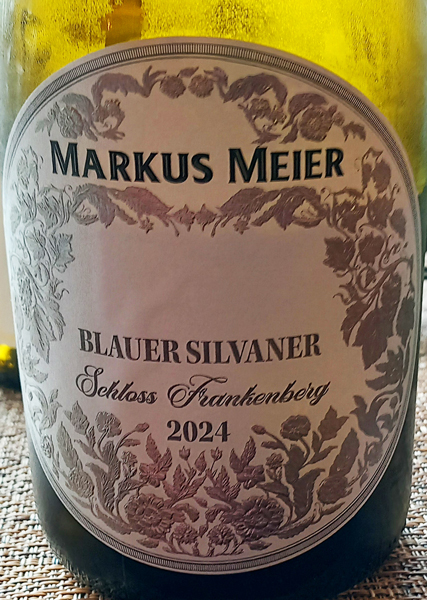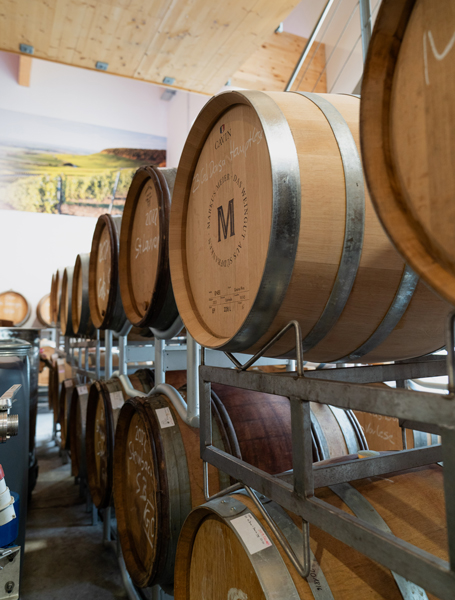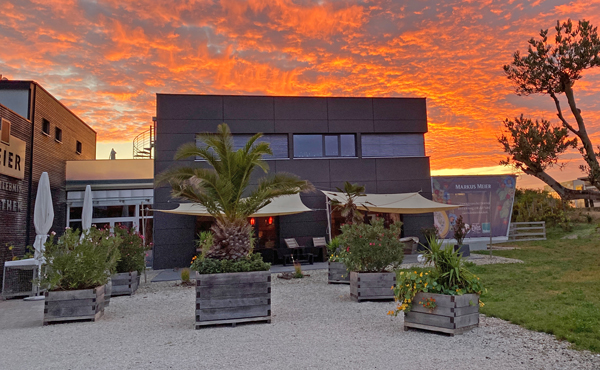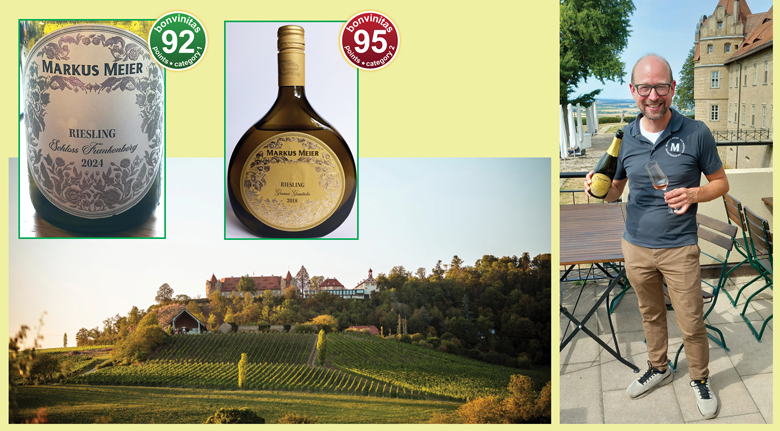Wines must be "drinky": not too heavy, simply fun
says Markus Meier – a very notable career changer winemaker – even with great wines
https://bonvinitas.com/media/reviews/photos/thumbnail/780x560c/2a/5c/70/wines-must-be-drinky-not-too-heavy-simply-fun-22-1755181129.jpg2024 Riesling Schloss Frankenberg Wine Estate Markus Meier
A German quality wine, dry, even if it doesn't say so on the label. I rated it with 92 bonvinitas points (green for dry up to 12% ABV - pictured above) and noted: Superb Riesling nose, white peach, a hint of lemon blossom; wonderfully compact, solid body with elegance and Riesling temperament, compact, lively finish, a wine that confidently says: "Here I am!" And one you can enjoy a glass or two more of.
Meier is, or rather, was, a technical business economist in the automotive industry, coming from a farming family in Ulsenheim in the deep southeast of the Franconian wine-growing region, a career changer. In 1990, his parents planted their first vineyard, initially for their own use. Which quickly developed by donations and sales to friends and acquaintances. And Meier felt more and more drawn to nature and viticulture. In 2005, after completing an apprenticeship as a winemaker, he founded the current winery, which now boasts a substantial 38 hectares in renowned Franconian locations such as Escherndorfer Lump, Randersackerer Pfülben and Sonnenstuhl, Sommerhäuser Steinbach, and Würzburger Kirchberg – some leased and some purchased, to name just the most important. Now he has leased the 18 hectares from Schloss Frankenberg.
This one aims in the same “drinky” direction:
2024 Schloss Frankenberg Blue Silvaner Wine Estatet Markus Meier
 A German quality wine, also with a pleasant 11.5% ABV, which I awarded 90 green bonvinitas points : A delicate nose with subtle notes of fruity apple compote; very appealing on the palate, with discreet sweetness and texture, and more fruity apple compote; a wine you'll love to linger on your tongue, and of which Meier says: "A local wine for everyone!" Blauer Silvaner, by the way, is a variation. It produces virtually no red pigment, making it a white wine.
A German quality wine, also with a pleasant 11.5% ABV, which I awarded 90 green bonvinitas points : A delicate nose with subtle notes of fruity apple compote; very appealing on the palate, with discreet sweetness and texture, and more fruity apple compote; a wine you'll love to linger on your tongue, and of which Meier says: "A local wine for everyone!" Blauer Silvaner, by the way, is a variation. It produces virtually no red pigment, making it a white wine.
Which brings us back to Frankenberg Castle , the historic castle that, from a completely run-down state, was exquisitely renovated by Prof. Dr. Peter Löw into a fantastic castle hotel, almost a miniature Versailles, with 18 hectares of vineyards surrounding the hill on which the castle sits, as well as on the adjacent hills. After an initial collaboration, Meier has now fully leased the 18 hectares, starting with the 2025 harvest.
Meier says to “drinky”
"We need alcohol management in the face of global warming. Cooler locations certainly help, but we also partially defoliate to curb the vines' sugar production and harvest as early as possible, never overripe, so that the grapes' sugar don't shoot up too high."
Naturally, his current vineyards, as one would expect in Franconia, primarily comprises 38% Silvaner, but also 25% Riesling, 18% Burgundy varieties, and others. He is particularly proud of his Rieslings from vines up to 50 years old, from which he produces not only "drinky" wines but also great wines that he thankfully ages for a long time, such as this:
2018 Sommerhäuser Steinbach Riesling Großes Gewächs dry Wine Estate Markus Meier
In a Bocksbeutel (see photo above), a German quality wine, 13%. A superb wine, which I rated with 95 red bonvinitas points (red for dry over 12%): A very fine, ripe Riesling nose, peach compote, lime, a hint of butter; an almost overwhelmingly full-bodied Riesling, lining the mouth, from which the Riesling variety rises delicately, with a light salty undertone, and where the wonderfully mature, highly elegant Riesling variety accompanies you for a long time on the finish. A wine truly with personality!


Meier formally runs the winery as MEIER Weinerlebnis GmbH. He also offers an inviting wine house with numerous events. As an organic winery, Meier also works sustainably with nature and is a member of Bioland, Slow Food, and Ethos, an association of 12 winemakers from Franconia who, despite their individual differences, share a common vision: sustainable viticulture.
Text, personal photos and bottle photos: Dieter Simon, other photos: PR





